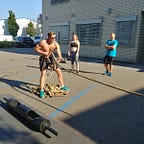I never rest.
And neither should you.
If people ask me, “How often do you train?” I answer “every day.” After a blink of a second, I see the shock in their faces, and I know what comes next: “But that is not healthy. You need to rest!”
See the thing is, I totally agree that training every day contradicts progress. You cannot go out and blast yourself in every session every day. But instead of resting, you should recover.
What’s the difference?
To me, resting means literally doing nothing. It is about laying in bed all day, literally doing nothing.
Recovery, however, is an intentional break.
It is about doing stuff that helps your body actively. I never try to be passive and do things without intention.
Here are some examples of activities I do to recover throughout the week:
Doing some relaxing Yoga, e.g. Yin Yoga which is static and aims to relax your muscles
- Stretching: Everything from static holds to dynamic stretches
- Learning to focus on guided meditation (I highly recommend using Headspace)
- Going to the sauna
- Releasing tight muscles with foam rolling
- Doing cardio at low intensity. It should feel effortless, and you shouldn’t sweat. I often do this when my legs are entirely busted from a tough workout to get the blood flowing.
My recovery rule even applies if I am injured.
Dr. Ashlee Hendy of the Institute for Physical Activity and Nutrition (IPAN) at Deakin University points out:
“People often think that if you’re injured then you shouldn’t exercise at all but that’s definitely not the case; you just need to know how to adapt your program.”
I am a strong advocate of this concept. If I am injured, I try to keep my body moving and work around the injury. Studies for various injuries indicate positive effects if you continue to exercise. [1,2,3,4,5] Of course, this means that you adapt your training accordingly and avoid
The only real break I give myself is if I am sick, especially if I have a cold. The risk of making it worse and creating a heart condition is simply too high. It is not worth it and you won’t lose your fitness within a week or two.
To increase the amount you can work out, you need to raise the equivalent amount of recovery.
The positive aspects I experience of different types of active recovery are various:
- Less intense delayed onset muscle soreness
- Faster recovery to train again
- Increased mobility
- Improved sleep
- Fewer injuries
So far, there are very few studies covering the topic if active recovery. Current literature focuses on active recovery immediately after the training and found positive effects on that. In my opinion, this would be an excellent topic for further scientific research.
This leads me to my question: What are your experiences with active recovery? Do you have any best practices?
Looking forward to your opinions.
And remember: Don’t stop until you’re proud. 🚀
Sources:
[1] https://www.physiology.org/doi/full/10.1152/japplphysiol.00971.2017
[3] https://www.ncbi.nlm.nih.gov/pubmed/15738787
[4] https://www.nejm.org/doi/full/10.1056/NEJM199902113400602
